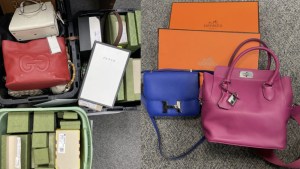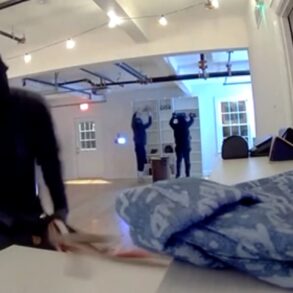A Los Angeles Organized Retail Crime Task Force (ORCTF) sting operation earlier this week led to the recovery of $300,000 in stolen luxury merchandise including apparel and designer handbags.
ORCTF, which includes police departments spanning L.A., Beverly Hills, Santa Monica, Burbank, Torrance and Glendale, served a search warrant at a Downtown, L.A. storefront on West 7th St., steps away from the city’s Fashion District. At the location, officers unearthed $23,000 in cash, a firearm and hundreds of pilfered products, from high-end eyewear to jewelry, clothing and high-value leather goods.
Now, detectives are working to identify the origin of the items and return them to victims. ORCTF is also seeking information about other organizations or individuals that may have received stolen wares from the business with the intent to resell them.
LAPD Lieutenant Michael McComas told Sourcing Journal that sophisticated fencing operations are becoming increasingly common—not just in L.A., but across the state. “You have a thief who commits the theft, and then they find a fence”—a receiver or mover for stolen goods—“and they resell it through either legitimate or illegitimate means.”
While many criminals sell stolen merchandise through social media or on web-based marketplaces, the operation busted on Tuesday was run out of a physical storefront. “It’s very hard for law enforcement to go [into a store], because you have to prove that the stuff is stolen,” he said. Many secondhand and consignment retailers throughout the city deal in pre-owned, and legitimately obtained, goods. But the sale of luxury products at impossibly low prices can set off alarm bells.
“It takes a while to develop the case,” McComas said, noting that ORCTF investigated the business for about a month before making a move. At this time, he could not disclose how many suspects were arrested in conjunction with the crimes.

Courtesy of LAPD
With such a scheme, there’s “no telling how many different hands touched [a product] before it reaches the final destination,” the lieutenant added. A thief might steal a $20,000 Hermès purse and sell it to a fence for $5,000 to make a quick buck and get it off their hands, he said by way of example. The fence might sell the bag to another buyer, who could pass it off at a profit once again, either in person or online. The longer that chain of custody grows, the more difficult it is to track a product and those involved in criminal acts.
ORCTF has been working directly with retailers to aid its investigations. “We reach out to them and have them come identify their product, they confirm that it was or was not in fact stolen, and then we return it to that retailer right then and there,” he said.
Tuesday’s takedown took place the same day that 100 California elected officials gathered at the Capitol to deliver public remarks about the impacts of retail theft and organized retail crime—issues that have hit urban centers across the Golden State especially hard in recent months.
Following the press conference, wherein several State Assembly members expressed support for recently introduced policy reform bills, Governor Gavin Newsom’s office released its own proposed framework for cracking down on property crimes like retail theft. It includes expanding criminal penalties and giving police and prosecutors more avenues and resources to take on criminals who participate in crimes like smash-and-grabs.
“Building on California’s existing laws and record public safety investments, I’m calling for new legislation to expand criminal penalties for those profiting on retail theft and auto burglaries,” Newsom said Tuesday. “These laws will make California safer and bolster police and prosecutor tools to arrest and hold professional criminals accountable.”
Under the governor’s plan, suspects who engage in retail theft with the intent to resell could face felony penalties and prison time, and large-scale resellers of stolen goods could also face harsher punishment. Police would be empowered with more enforcement tools, ensuring that they are able to make arrests in incidents of retail theft even if they did not witness a crime in progress.
Newsom advocated for clarifications to the existing penal code, which allows law enforcement to combine or aggregate the value of multiple thefts, even across different victims, to reach the threshold for grand theft, which can carry a felony charge. New penalties would be instituted for professional auto burglary, too, raising penalties for the possession of and intent to resell items stolen from a car.
Finally, the governor’s office endorsed eliminating the sunset date for the organized retail crime statute, which expires Jan. 1, 2026. The law, which allows specific acts of shoplifting and fraud committed with or at the agency of one or more other people to be charged as felonies, has been employed effectively by California Highway Patrol (CHP) and others in the statewide ORCTF, it said.
“This framework will close loopholes criminals have exploited and increase felony penalties for smash and grabs, retail theft, and auto burglaries,” president of the California State Sheriffs’ Association Tulare County Sheriff Mike Boudreaux said. “California is safer when law enforcement and prosecutors have more tools to arrest suspects and hold them accountable.”
“While we must always create pathways for restorative justice and redemption, we must also hold people accountable as they violate the rights of others,” California State Senate Public Safety Chair Sen. Aisha Wahab added. With the epidemic of retail theft and robberies in our communities, we must provide prosecutors the necessary tools to address a plague of lawlessness that is threatening of our very way of life.”
California Attorney General Rob Bonta said the Department of Justice was “committed to tackling these crimes head-on” to mitigate risk to businesses, retailers, workers and the public. “We appreciate the Governor’s leadership, and will continue working with his office and our legislative partners to eradicate organized retail crime,” he added.
“I applaud Governor Newsom for prioritizing the fight against retail theft with his release of a strong legislative package,” chair of the Assembly Select Committee on Retail Theft Assemblymember Rick Chavez Zbur said. “I am confident that together, we will meet this moment with new approaches that are effective and protect our neighborhoods and hold professional criminals and repeat offenders accountable.”






